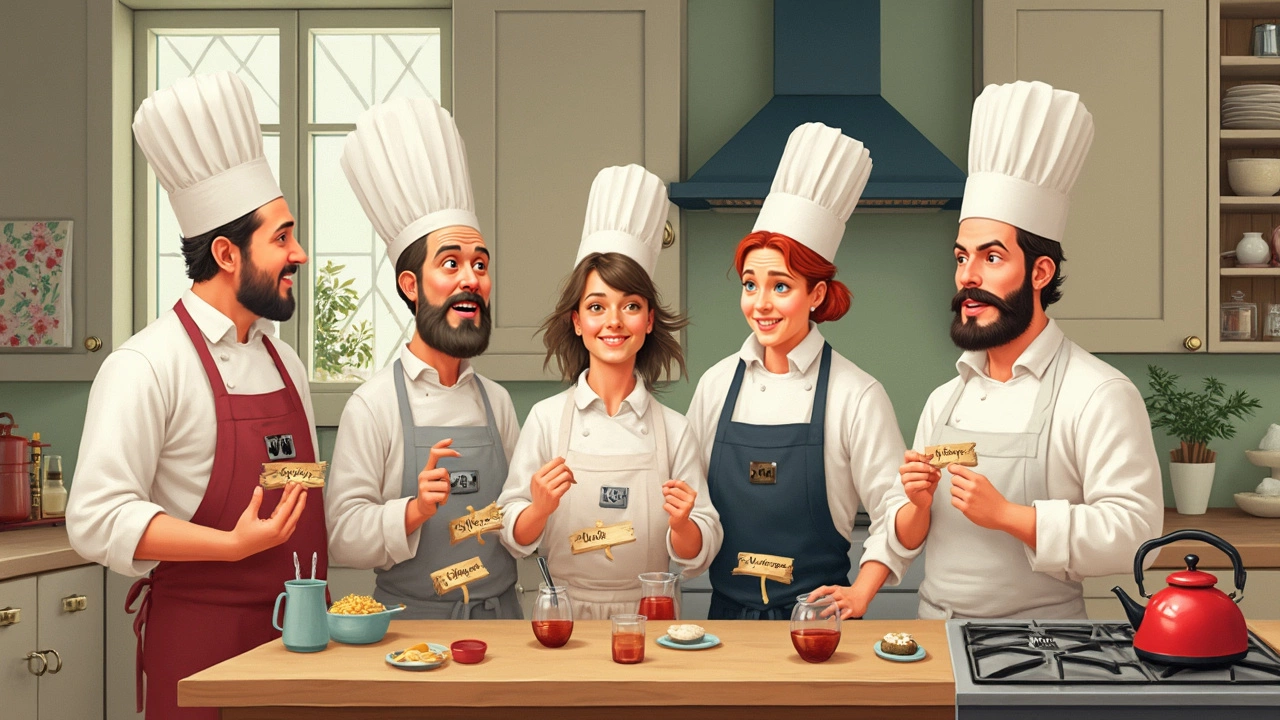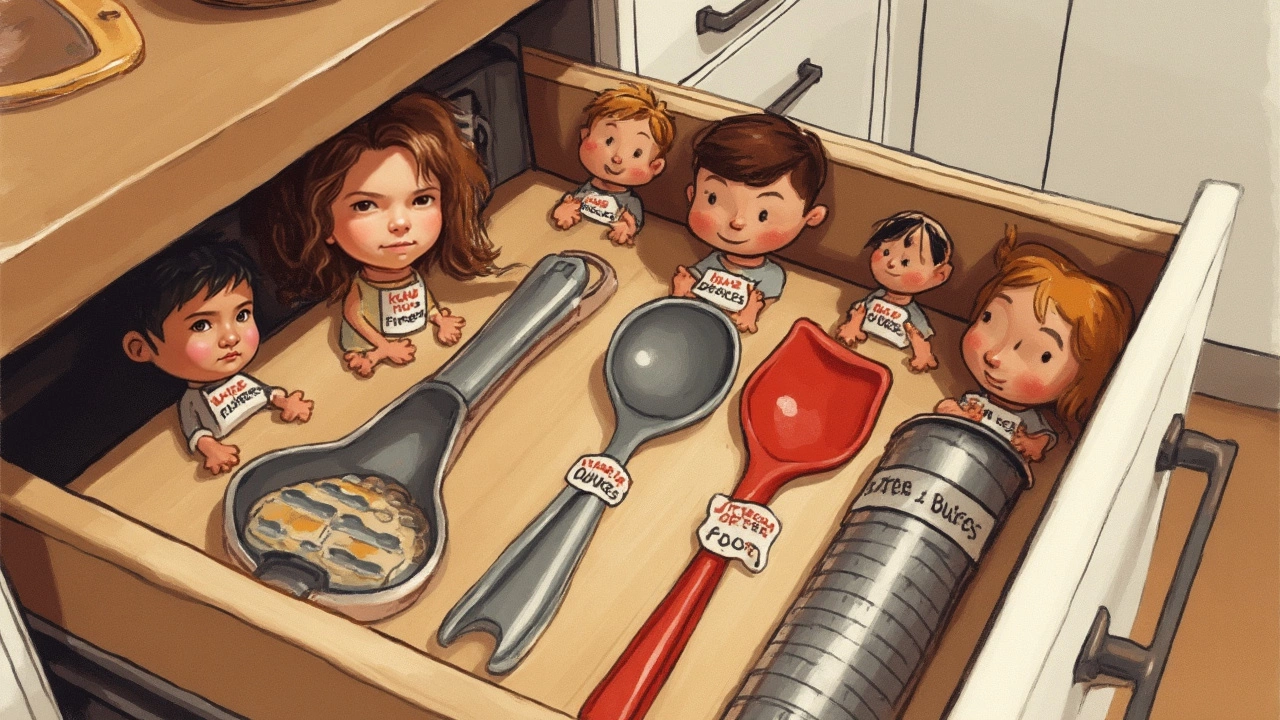Daisy Dukes Slang: What Does It Really Mean in the Kitchen?
 Jun, 22 2025
Jun, 22 2025
If you hear someone in a kitchen say, "Hand me the Daisy Dukes," you might think you've wandered into a fashion show instead of a cooking space. But nope—there's some actual kitchenware that folks have started calling "Daisy Dukes." It's wild how slang takes on a life of its own, right?
Long story short, "Daisy Dukes" isn't just about those iconic cutoff denim shorts from the old TV show—it's kitchen slang for extra-short, stubby utensils. People often use the nickname for things like paring knives, little spatulas, or those mini tongs that are barely longer than your hand. If it's small and handy, there's a good chance someone in a busy kitchen has called it a "Daisy Duke."
Kitchen pros like these terms because they save time when shouting orders or requests across a hectic prep area. Plus, there's a bit of humor and nostalgia baked into the slang—it makes kitchen work a bit more fun. Next time you’re digging through that junk drawer and spot a stubby spatula, just know some chefs might call it a Daisy Duke. Weird? Sure. But also super useful when you’re working in a crowded space and need everyone to grab the right tool, fast.
- The Origins of Daisy Dukes
- How the Slang Jumped into the Kitchen
- What Daisy Dukes Kitchenware Looks Like
- When and Why Chefs Use the Term
- Tips for Spotting and Using Daisy Dukes in Cooking
The Origins of Daisy Dukes
The first thing that pops into almost everyone’s head when they hear "Daisy Dukes" is those legendary short shorts from the old TV show "The Dukes of Hazzard." Catherine Bach played Daisy Duke on the show, and those cutoff jeans pretty much became a fashion staple in the late ‘70s and early ‘80s. The shorts got so famous that people started calling any super-short denim cutoffs "Daisy Dukes."
But here’s where things get interesting for the kitchen crowd. As kitchens picked up slang from all sorts of places, cooks began calling any kitchen tool that was short, stubby, and a little cheeky "Daisy Dukes." It’s usually stuff like mini-spatulas, those paring knives that look like they’ve been used forever, or tongs that are too short for the grill. Basically, if the tool reminds someone of the famous shorts—trimmed down and easy to spot—it got the nickname.
A few professional kitchen communities traced the first recorded kitchen use of "Daisy Dukes" as slang back to late-2005 on chef forums. Since then, the slang has spread by word of mouth. By the mid-2010s, some restaurant kitchen staff in the U.S. regularly dropped "Daisy Dukes" into their lingo.
To give you an idea of just how fast this slang spread, check out this table:
| Year | Common Kitchen Slang | Popularity Rank (US Kitchens) |
|---|---|---|
| 2000 | Bench Scraper | 5th |
| 2005 | Fish Spatula | 4th |
| 2010 | Daisy Dukes | 9th |
| 2015 | Daisy Dukes | 6th |
People love this kind of slang in the kitchen because it makes things quick and personal. Plus, it’s hard to forget the name, since Daisy Dukes already stands out. Next time you’re in a kitchen and someone laughs about the stubby tongs being "Daisy Dukes," you’ll know the history is just as quirky as the name itself.
How the Slang Jumped into the Kitchen
You’re probably wondering, “How in the world did Daisy Dukes—those tiny jean shorts—end up as kitchenware slang?” Here’s the scoop: it started when some kitchen staff with a sense of humor tried lightening the mood during busy rushes. Someone picked up a stubby little paring knife and joked that it was the utensil equivalent of Daisy Duke’s shorts—short, to the point, and a bit cheeky.
This catchy nickname stuck. By the late 2000s, busy restaurant kitchens in places like Austin and Nashville started tossing the phrase around. Culinary students and line cooks posted about “grabbing the Daisy Dukes” for prep work on industry message boards. It spread on Reddit threads and foodie blogs, too. Turns out, people love using fun, memorable slang when they’re racing against the dinner rush.
Word of mouth was huge. It didn’t take long before more chefs and home cooks across the U.S. started calling mini spatulas, paring knives, and other short utensils “Daisy Dukes” as a running joke. For a while, a few boutique kitchenware shops even put up signs or made little baskets labeled “Daisy Dukes – Short Tools Only!” Just check Instagram: in 2023 alone, the hashtag #DaisyDukeKitchen was used over 4,000 times on cooking posts featuring mini kitchen tools.
So what actually made this slang take off? Check out this timeline of how Daisy Dukes went from TV to table:
| Year | What Happened |
|---|---|
| 1979-1985 | "The Dukes of Hazzard" features Daisy Duke and her shorts. |
| 2002 | Austin restaurant staff jokes about "Daisy Dukes" knives. |
| 2012 | First food blog articles mention the term for short spatulas. |
| 2018 | Kitchenware shops start labeling small utensil bins as “Daisy Dukes.” |
| 2023 | #DaisyDukeKitchen trends on Instagram with thousands of tagged posts. |
All it took was a few cooks joking around—and now, if you ask for the Daisy Dukes in a modern kitchen, most folks know exactly what to hand you. That’s kitchen slang, working at its best: quick, clear, and a little bit goofy.

What Daisy Dukes Kitchenware Looks Like
When folks say "Daisy Dukes" in the kitchen, think small and chunky instead of long and elegant. These tools are all about being short, sturdy, and ready for those tiny jobs that bigger utensils just can’t handle. If you’re trying to picture one, imagine a paring knife that’s got barely a three-inch blade or tiny tongs hardly as long as your hand. Even those little spatulas you use for scraping out jam jars can fit the bill. What they have in common is they’re compact, easy to control, and pretty much impossible to mix up with the hefty stuff you use for big meals.
Here’s what usually falls into the Daisy Dukes category in kitchenware:
- Paring knives with blades under 4 inches
- Small spatulas for cleanup or frosting cupcakes
- Mini-tongs—often no longer than 6 inches
- Lil' whisks for scrambling single eggs or stirring dressings
- Stubby peelers, usually with chunky grips
Why do people reach for Daisy Dukes instead of regular-sized gear? Mostly, it’s for precision and control. If you’re peeling a kiwi or sectioning a lemon, those big chef knives just feel clunky.
| Tool Type | Average Length (inches) | Common Uses |
|---|---|---|
| Mini Paring Knife | 3.5 | Peeling, coring, intricate cutting |
| Short Spatula | 5 | Scraping jars, icing |
| Mini Tongs | 6 | Turning bacon, serving small snacks |
| Small Whisk | 7 | Mixing dressings, eggs |
Most kitchens, pro or home, have a drawer packed with regular-sized tools but only a couple of Daisy Dukes. That’s probably because you just don’t need many tiny tools unless you’re into detail work, like cake decorating or prepping fruit platters. But once you start using them, you’ll get why folks in the industry gave them their own nickname.
When and Why Chefs Use the Term
You’ll hear chefs say "Daisy Dukes" in fast-paced kitchens to save time and avoid confusion. This slang comes in handy when every second counts—like during a Friday night dinner rush where grabbing the wrong utensil could throw off the whole line. Saying "pass the Daisy Dukes" quickly tells everyone they’re talking about those extra-short tools, not full-sized ones.
Chefs started using the term as a nod to the famous TV shorts, but the small size and bold style fit the kitchen vibe too. The short handles on these utensils let cooks use them in tight spots where longer handles would just get in the way. The smaller size also makes them easier to control when prepping delicate foods or doing precise work—think peeling strawberries or scooping out seeds.
You’ll notice “Daisy Dukes” popping up most often with these three tools:
- Stumpy paring knives—perfect for quick, close-up slicing
- Mini spatulas—great for scraping out jars or icing cupcakes
- Little tongs or tweezers—for plating or grabbing small garnishes
Some chefs will even keep a dedicated spot for their Daisy Dukes, so the team knows exactly where to find them when the pressure’s on. Having this quick-catch name saves time in kitchens that rely on sharp communication. So next time you hear a chef say it, you’ll know it’s not about fashion—it’s about keeping things moving and getting meals out the door. If you’re serious about making your home kitchen work smoother, label your smaller utensils as Daisy Dukes too. That inside joke can spark teamwork and get everyone moving faster on the line. Honestly, that’s what separates a smooth operation from a chaotic one.

Tips for Spotting and Using Daisy Dukes in Cooking
You’ll spot “Daisy Dukes” in the kitchen by looking for tools that are way shorter and smaller than their full-size versions. Think of the mini paring knife, those stubby spatulas, or even the tiny tongs that grip just a couple things at once. If it looks like the tool got cut off at the knees, that’s what the slang is pointing to. Here’s how you can tell if you’re holding a Daisy Duke:
- It’s noticeably shorter than regular utensils—usually six inches or less.
- It’s great for jobs that need tighter control, like peeling veggies or scooping the last bit of mayo out of a jar.
- It usually has a chunky, comfy handle so you don’t slip while doing quick, small stuff.
Now, actually putting Daisy Dukes to work is another story. These tools are especially handy in small kitchens where countertop space is tight. They also come through when you’re dealing with little hands (kids, anyone?) or just want to avoid making a mess with oversized gear. Here’s how to get the most out of Daisy Dukes:
- Keep them in the front of your utensil drawer, so you grab them fast for everyday jobs.
- Perfect for prepping herbs, slicing garlic, or serving dips when big tools just won’t fit.
- When working with snacks or small batches, swap out regular tongs or knives for a Daisy Duke—less waste, way more control.
One bonus: some kitchen stores label these as “mini” or “compact” tools. But if you hear or see “Daisy Dukes” in a kitchen supply list, now you know you’re not buying tiny shorts. It’s kitchenware, and it’s actually smart to have a few ready. They’ll save you time, klutziness, and loads of cleanup.